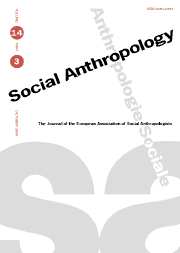Article contents
Introduction. Threatening communication: The discomfort of proximity
Published online by Cambridge University Press: 10 July 2006
Extract
As convenors of the Younger Scholars' Forum for the 2004 EASA Conference in Vienna, we were charged with devising an international panel that would address the general theme ‘Face-to-face. Connecting distance and proximity’. Our panel, originally entitled ‘When communication ends …’, was thus a provocation to think ethnographically about the relationships through which anthropologists habitually conduct fieldwork. In particular we wanted to provoke discussion on what we termed ‘the discomfort of proximity’ and to think further about fieldwork circumstances in which anthropologists might actually seek to establish ‘distance’ rather than ‘proximity’ while in the field. Anthropologists tend to assume that the quality of their ethnographic evidence depends on the quality of interaction and communication with their interlocutors. This after all is why we continue to fight for the chance to carry out long-term fieldwork and insist on the necessity of proficiency in local languages. There is furthermore a common disciplinary assumption that close and intense relationships enable a sense of identification (albeit partial and vicarious) with those with whom we carry out the research. Our ethnographic understandings thus depend on finding ways of overcoming distance as we strive to transform the mutual ‘strangeness’ of the early stages of fieldwork into a more cosy proximity through which some degree of mutual understanding might be achieved. After all, the quality of our ethnographic knowledge is fundamentally based on the relationships between the researcher and those individuals she or he is living with.
- Type
- Younger Scholars's Forum
- Information
- Copyright
- © Cambridge University Press 2006
- 1
- Cited by


